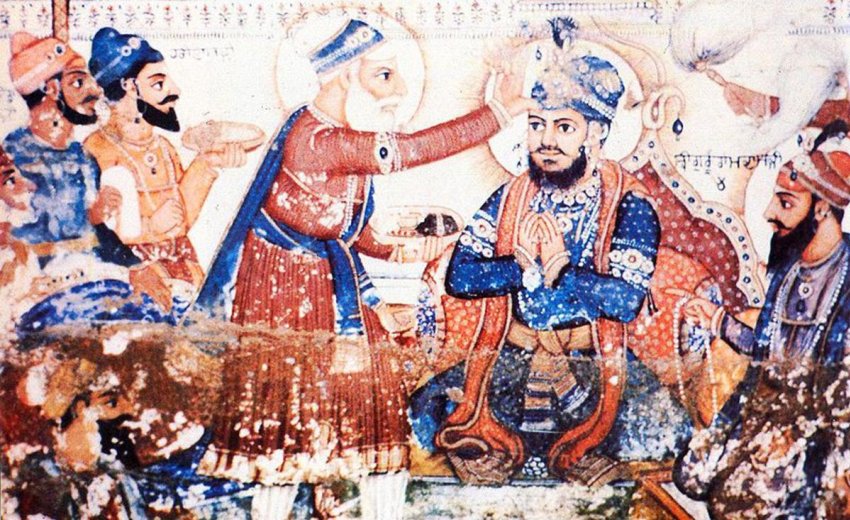
Guru Arjun the Fifth Sikh Guru was informed of an impending attack by a Muslim official named Sulahi Khan. A meeting was called to make out a plan for defense. Many suggestions were made but the Guru said it was best to depend on Divine protection. Sulahi Khan set out to attack but died on the way as the horse he was riding bolted and fell onto a hot brick kiln. The Guru describes the incident thus:
ਪ੍ਰਥਮੇ ਮਤਾ ਜਿ ਪਤ੍ਰੀ ਚਲਾਵਉ ॥ ਦੁਤੀਏ ਮਤਾ ਦੁਇ ਮਾਨੁਖ ਪਹੁਚਾਵਉ ॥
ਤ੍ਰਿਤੀਏ ਮਤਾ ਕਿਛੁ ਕਰਉ ਉਪਾਇਆ ॥ ਮੈ ਸਭੁ ਕਿਛੁ ਛੋਡਿ ਪ੍ਰਭ ਤੁਹੀ ਧਿਆਇਆ ॥੧॥
ਮਹਾ ਅਨੰਦ ਅਚਿੰਤ ਸਹਜਾਇਆ ॥ ਦੁਸਮਨ ਦੂਤ ਮੁਏ ਸੁਖੁ ਪਾਇਆ ॥੧॥ ਰਹਾਉ॥ ੫ ੩੭੧
The first proposal was to dispatch a letter; the second to send two messengers; the third proposal was to take some action; but I left every thing and remembered God: 1: This was great bliss, I became worry-less and at peace; the attacking enemy perished and things remained blissful: Pause: (M: 5, SGGS, p 371).
Such providential protection for those who seek Divine sanctuary is not uncommon. Sri Guru Granth Sahib describes at least three more cases. The boy-devotee Prahlad was saved from death ordered by his savage father Harnakhash or Harnakashyap (SGGS, p 856). Bhagat Kabir was saved when an intoxicated elephant that was meant to attack him did not do so (SGGS, p 870-71). Bhagat Namdev was told he would die unless he showed the miracle of reviving a dead cow. He did nothing except to pray and the cow was revived (SGGS, p1165-66).
These may truly be called miracles by God.
In all the four cases no efforts were made by the intended victims to save themselves or seek help. They knew from their Divine vision how things would turn out to be. However there are stories of even ordinary mortals receiving help. On Sep 11, 2001 CE my niece got late in reaching for her work at the World Trade Center New York, USA before it was brought down by the terrorists. There are other stories like some one missing a flight which crashes, a child being transported by flood waters to safety and so on.
It is necessary for any one threatened with violence to take defensive action but those believing in God do so with confidence:
ਅਉਖੀ ਘੜੀ ਨ ਦੇਖਣ ਦੇਈ ਅਪਨਾ ਬਿਰਦੁ ਸਮਾਲੇ ॥
ਹਾਥ ਦੇਇ ਰਾਖੈ ਅਪਨੇ ਕਉ ਸਾਸਿ ਸਾਸਿ ਪ੍ਰਤਿਪਾਲੇ ॥੧॥ ੫ ੬੮੨
It is God’s nature not to let His servants face difficult times; He extends His hand of help to protect them at every breath (M: 5, SGGS, p 682).
The fifth Guru says:
ਜਿਸੁ ਰਾਖੈ ਤਿਸੁ ਕੋਇ ਨ ਮਾਰੈ ॥ ਸੋ ਮੂਆ ਜਿਸੁ ਮਨਹੁ ਬਿਸਾਰੈ ॥ ੫ ੨੯੨
No one can kill one whom God protects; but one whom God forgets, dies (M: 5, SGGS, p292).
For a man (and woman) of God therefore His remembrance is a blessing in itself and a source of strength. He says:
ਸਿਮਰਿ ਸਿਮਰਿ ਸਿਮਰਿ ਸੁਖੁ ਪਾਇਆ ਚਰਨ ਕਮਲ ਰਖੁ ਮਨ ਮਾਹੀ ॥
ਤਾ ਕੀ ਸਰਨਿ ਪਰਿਓ ਨਾਨਕ ਦਾਸੁ ਜਾ ਤੇ ਊਪਰਿ ਕੋ ਨਾਹੀ ॥੨॥੧੨॥੯੮॥ ੫ ੮੨੪
I seek the sanctuary of one above whom there is none; ever meditating with His lotus feet in mind is bliss (M: 5, SGGS, p 842).
God is the father of us all; He does not do any thing that is not good for His creation. The fifth Guru says:
ਇਸ ਤੇ ਹੋਇ ਸੁ ਨਾਹੀ ਬੁਰਾ ॥ ਓਰੈ ਕਹਹੁ ਕਿਨੈ ਕਛੁ ਕਰਾ ॥
ਆਪਿ ਭਲਾ ਕਰਤੂਤਿ ਅਤਿ ਨੀਕੀ ॥ ਆਪੇ ਜਾਨੈ ਅਪਨੇ ਜੀ ਕੀ ॥ ੫ ੨੯੪
God does nothing bad; any way who else can do any thing? He is good Himself and so is what he does (M: 5, SGGS, p 294).
So, if something, that we consider unfavorable, happens we should accept it with the belief that it is part of God plan and that cannot be bad for us even if it hurts temporarily.
We do not know what lies ahead. However the fear of the unknown and even the pain in case something untoward happens are considerably reduced if it is realized that nothing happens without reason. It is a result of Karma. Guru Nanak says:
ਕਿਰਤੁ ਪਇਆ ਨਹ ਮੇਟੈ ਕੋਇ ॥ ਕਿਆ ਜਾਣਾ ਕਿਆ ਆਗੈ ਹੋਇ ॥
ਜੋ ਤਿਸੁ ਭਾਣਾ ਸੋਈ ਹੂਆ ॥ ਅਵਰੁ ਨ ਕਰਣੈ ਵਾਲਾ ਦੂਆ ॥੧॥ ੧ ੧੫੪
No one can erase Karma; I do not know what lies ahead; whatever God wills happens; there is none else who makes things happen (M: 1, SGGS, 154).
Gurbani advises people to realize that any one who transgresses the laws of nature and of the land would suffer:
ਦਦੈ ਦੋਸੁ ਨ ਦੇਊ ਕਿਸੈ ਦੋਸੁ ਕਰੰਮਾ ਆਪਣਿਆ ॥ ਜੋ ਮੈ ਕੀਆ ਸੋ ਮੈ ਪਾਇਆ ਦੋਸੁ ਨ ਦੀਜੈ ਅਵਰ ਜਨਾ ॥੨੧॥ ੧ ੪੩੩
Do not blame any one else, the blame lies with one’s own deeds; I receive the result of whatever I do and cannot blame others ((M 1, SGGS, p 433).
Further the realization that God’s will prevails helps condition oneself to face all circumstances with fortitude and equanimity.
It is not only threat to life against which one may need help. There are times when we need physical, emotional or financial support. In such cases we may depend on the Divine or seek help from people around us. In the latter cases, except some golden exceptions, one who helps expects the beneficiary to be obligated if not be subservient to him/ her. Human beings who help others are always on the lookout for opportunities when they can get the recipient to pay back in whatever form:
ਜਿਨਾ ਪਿਛੈ ਹਉ ਗਈ ਸੇ ਮੈ ਪਿਛੈ ਭੀ ਰਵਿਆਸੁ ॥ ਜਿਨਾ ਕੀ ਮੈ ਆਸੜੀ ਤਿਨਾ ਮਹਿਜੀ ਆਸ ॥੧॥ ੫ ੧੦੯੭
Those whom I look unto look to me; from whom I expect also expect from me (M: 5, SGGS, p 1087).
Even those who give charity expect God to reward and people to acclaim them:
ਸਤੀਆ ਮਨਿ ਸੰਤੋਖੁ ਉਪਜੈ ਦੇਣੈ ਕੈ ਵੀਚਾਰਿ ॥ ਦੇ ਦੇ ਮੰਗਹਿ ਸਹਸਾ ਗੂਣਾ ਸੋਭ ਕਰੇ ਸੰਸਾਰੁ ॥ ੧ ੪੬੫
Those who give feel satisfied thinking of having given; they keep giving but expect a thousand times from the Divine and admiration of the world (M: 1, SGGS, p 465).
This is not so with God. Guru Nanak says:
ਜੇ ਕੋ ਏਕ ਕਰੈ ਚੰਗਿਆਈ ਮਨਿ ਚਿਤਿ ਬਹੁਤੁ ਬਫਾਵੈ ॥ ਏਤੇ ਗੁਣ ਏਤੀਆ ਚੰਗਿਆਈਆ ਦੇਇ ਨ ਪਛੋਤਾਵੈ ॥੩॥ ੧ ੧੩੨੮
When some one does one good deed he (or she) feels proud in his mind; God with so many virtues and goodness never worries about it (M: 1, SGGS, p 1328).
It is not uncommon for some people trying to gain unfair advantage by winning favor of someone in a position or authority. But it does not always work out that way. For example an employee may want to get placed where he or she thinks the boss would be favorable. On obtaining the desired placement the person does not work properly and takes liberties. It however happens many times that either the expectation has the opposite effect or the intended benefactor moves from that position. It is best to believe that performance will always be rewarded and work hard. The fourth Guru taking the analogy of the King as the employer says:
ਨਰੁ ਪ੍ਰਾਣੀ ਚਾਕਰੀ ਕਰੇ ਨਰਪਤਿ ਰਾਜੇ ਅਰਥਿ ਸਭ ਮਾਇਆ ॥ ਕੈ ਬੰਧੈ ਕੈ ਡਾਨਿ ਲੇਇ ਕੈ ਨਰਪਤਿ ਮਰਿ ਜਾਇਆ ॥
ਧੰਨੁ ਧਨੁ ਸੇਵਾ ਸਫਲ ਸਤਿਗੁਰੂ ਕੀ ਜਿਤੁ ਹਰਿ ਹਰਿ ਨਾਮੁ ਜਪਿ ਹਰਿ ਸੁਖੁ ਪਾਇਆ ॥੨॥ ੪ ੧੬੬
A person obtains service of the king for financial benefit; the king may imprison or fine him, or the king may die; for real success one should seek the service of the Master and obey the commands (remember to carry out the duties) and by doing so obtain peace (M: 4, SGGS, p 166).
In pursuit of taking advantage rather than work hard one has to please many people one after another. The ninth Guru says:
ਸੁਖ ਕੈ ਹੇਤਿ ਬਹੁਤੁ ਦੁਖੁ ਪਾਵਤ ਸੇਵ ਕਰਤ ਜਨ ਜਨ ਕੀ ॥
ਦੁਆਰਹਿ ਦੁਆਰਿ ਸੁਆਨ ਜਿਉ ਡੋਲਤ ਨਹ ਸੁਧ ਰਾਮ ਭਜਨ ਕੀ ॥੧॥ ੯ ੪੧੧
Chasing happiness, man suffers the indignity of serving many masters; he is like a stray dog that goes from door to door, forgetting to depend on one Master (M: 9, SGGS, p 411).
Being dependent on some one is demeaning; it is killing if it continues for long. A person with self respect would rather die than permanently depend on another. Sheikh Farid says:
ਫਰੀਦਾ ਬਾਰਿ ਪਰਾਇਐ ਬੈਸਣਾ ਸਾਂਈ ਮੁਝੈ ਨ ਦੇਹਿ ॥ ਜੇ ਤੂ ਏਵੈ ਰਖਸੀ ਜੀਉ ਸਰੀਰਹੁ ਲੇਹਿ ॥੪੨॥ ਫ ੧੩੮੦
O God, do not make me dependent on some one else; if this is how it is to be please take my life (Farid, SGGS, p 1380).
However it is different with God; He enjoys giving:
ਲੋਕੁ ਧਿਕਾਰੁ ਕਹੈ ਮੰਗਤ ਜਨ ਮਾਗਤ ਮਾਨੁ ਨ ਪਾਇਆ ॥
ਸਹ ਕੀਆ ਗਲਾ ਦਰ ਕੀਆ ਬਾਤਾ ਤੈ ਤਾ ਕਹਣੁ ਕਹਾਇਆ ॥੪॥੮॥ ੧ ੮੭੮
People curse one who begs, this is demeaning; but the story of those who knock at the Master’s door is different, He encourages people to ask (M: 1, SGGS, p 878).
And God just keep giving even though those receiving may get tired:
ਦੇਦਾ ਦੇ ਲੈਦੇ ਥਕਿ ਪਾਹਿ ॥ ਜੁਗਾ ਜੁਗੰਤਰਿ ਖਾਹੀ ਖਾਹਿ ॥ ੧ ੨
God keeps giving even when those receiving get tired; this has been happening through the ages (M: 1, SGGS, p 2).
One who realizes this no longer makes himself dependent on others and seeks only the Divine support:
ਮਾਂਗਉ ਰਾਮ ਤੇ ਸਭਿ ਥੋਕ ॥ ਮਾਨੁਖ ਕਉ ਜਾਚਤ ਸ੍ਰਮੁ ਪਾਈਐ ਪ੍ਰਭ ਕੈ ਸਿਮਰਨਿ ਮੋਖ ॥੧॥ ਰਹਾਉ ॥ ੫ ੬੮੨
Whatever I need I will ask God; asking another person is just waste of effort; by remembering God one is freed from needs: Pause: (M: 5, SGGS, p682).
ਗੁਰ ਪਰਸਾਦਿ ਮੇਰੈ ਮਨਿ ਵਸਿਆ ਜੋ ਮਾਗਉ ਸੋ ਪਾਵਉ ਰੇ ॥
ਨਾਮ ਰੰਗਿ ਇਹੁ ਮਨੁ ਤ੍ਰਿਪਤਾਨਾ ਬਹੁਰਿ ਨ ਕਤਹੂੰ ਧਾਵਉ ਰੇ ॥੧॥ ੫ ੪੦੪
By guru’s grace, God abides in my mind, I receive what I ask; I feel satisfied being imbued in Naam and look nowhere else again (M: 5, SGGS, p 404).
When one learns to trust the Divine all asking stops. As soon as a thought comes to the devotee’s mind the Creator fulfills it:
ਚਿਤਿ ਜਿ ਚਿਤਵਿਆ ਸੋ ਮੈ ਪਾਇਆ ॥ ਨਾਨਕ ਨਾਮੁ ਧਿਆਇ ਸੁਖ ਸਬਾਇਆ ॥੪॥ ੫ ੭੦੫
Whatever I think of, I receive; remembering Naam is such bliss (M: 5, SGGS, p 705).
On experiencing this bliss one looks back at the wanderings and decides:
ਮਿਲਿ ਪੰਚਹੁ ਨਹੀ ਸਹਸਾ ਚੁਕਾਇਆ ॥ ਸਿਕਦਾਰਹੁ ਨਹ ਪਤੀਆਇਆ ॥ ਉਮਰਾਵਹੁ ਆਗੈ ਝੇਰਾ ॥
ਮਿਲਿ ਰਾਜਨ ਰਾਮ ਨਿਬੇਰਾ ॥੧॥ ਅਬ ਢੂਢਨ ਕਤਹੁ ਨ ਜਾਈ ॥ ਗੋਬਿਦ ਭੇਟੇ ਗੁਰ ਗੋਸਾਈ ॥ ਰਹਾਉ ॥ ੫ ੬੨੧
The local elders could not relive me of doubts; I could not get what I wanted from the officials, I expressed my problems to the rulers but they remained; but was relieved of the problems by the Lord; having found the Master I do not now have to look any where else: Pause: (M: 5, SGGS, p 621).
The devotee therefore wants to be with God; that is all he asks for:
ਤੁਧੁ ਬਾਝੁ ਪਿਆਰੇ ਕੇਵ ਰਹਾ ॥ ਸਾ ਵਡਿਆਈ ਦੇਹਿ ਜਿਤੁ ਨਾਮਿ ਤੇਰੇ ਲਾਗਿ ਰਹਾਂ ॥
ਦੂਜਾ ਨਾਹੀ ਕੋਇ ਜਿਸੁ ਆਗੈ ਪਿਆਰੇ ਜਾਇ ਕਹਾ ॥੧॥ ਰਹਾਉ ॥ ੧ ੬੬੦
O Lord how can I ever be without You? Grant me the state in which I always remember You; my beloved there is none else whom I can approach: Pause: (M: 12, SGGS, p 660).
A profound and sweet relationship thus develops in which the Creator accepts the devotee and hugs him. The Creator overlooks shortcomings and rewards even the slightest effort by the devotee:
ਜੋ ਸਰਣਿ ਆਵੈ ਤਿਸੁ ਕੰਠਿ ਲਾਵੈ ਇਹੁ ਬਿਰਦੁ ਸੁਆਮੀ ਸੰਦਾ ॥
ਬਿਨਵੰਤਿ ਨਾਨਕ ਹਰਿ ਕੰਤੁ ਮਿਲਿਆ ਸਦਾ ਕੇਲ ਕਰੰਦਾ ॥੪॥ ੫ ੫੪੪
Whosoever seeks refuge in God, the Lord embraces him; this is the Master’s nature; pray I have found the Lord and am joyful (M: 5, SGGS, p 544).
ਮਿਠ ਬੋਲੜਾ ਜੀ ਹਰਿ ਸਜਣੁ ਸੁਆਮੀ ਮੋਰਾ ॥ ਹਉ ਸੰਮਲਿ ਥਕੀ ਜੀ ਓਹੁ ਕਦੇ ਨ ਬੋਲੈ ਕਉਰਾ ॥
ਕਉੜਾ ਬੋਲਿ ਨ ਜਾਨੈ ਪੂਰਨ ਭਗਵਾਨੈ ਅਉਗਣੁ ਕੋ ਨ ਚਿਤਾਰੇ ॥
ਪਤਿਤ ਪਾਵਨੁ ਹਰਿ ਬਿਰਦੁ ਸਦਾਏ ਇਕੁ ਤਿਲੁ ਨਹੀ ਭੰਨੈ ਘਾਲੇ ॥ ੫ ੭੮੪
My Lord and Master, my friend, is sweet speaking; I do not remember he ever speaking arrogantly; arrogance is not in the nature of my perfect Lord, nor does He remind me of my shortcomings; it is His nature to lift the fallen and does not ignore even the slightest effort (M: 5, SGGS, p 784).
The devotee cannot describe the experience of Divine grace. He finds he does not even have to think what he needs; the Creator knows what is needed and provides, but rare are such devotees:
ਬਹੁਤਾ ਕਰਮੁ ਲਿਖਿਆ ਨਾ ਜਾਇ ॥ ਵਡਾ ਦਾਤਾ ਤਿਲੁ ਨ ਤਮਾਇ ॥
ਆਪੇ ਜਾਣੈ ਆਪੇ ਦੇਇ ॥ ਆਖਹਿ ਸਿ ਭਿ ਕੇਈ ਕੇਇ ॥ ੧ ੫
The abundance of Divine grace cannot be described; the great benefactor expects nothing in return; ---- He knows what is needed, and gives; but those who acknowledge this are rare (M: 1, SGGS, p 5).
With this experience the devotee advises others:
ਕਬੀਰ ਕਾਮ ਪਰੇ ਹਰਿ ਸਿਮਰੀਐ ਐਸਾ ਸਿਮਰਹੁ ਨਿਤ ॥
ਅਮਰਾ ਪੁਰ ਬਾਸਾ ਕਰਹੁ ਹਰਿ ਗਇਆ ਬਹੋਰੈ ਬਿਤ ॥੧੬੩॥ ਕ ੧੩੭੩
The way we remember God when we are in need, we should remember Him always; this way we can get to be immortal (not be subject to cycles of death and rebirth) and the lost wealth will return (SGGS p 1373).
 A true devotee therefore does not think of God only to gain something or even to please Him; his duty is only to serve which translates into working in his assigned role as a householder diligently. If the Master is not pleased he realizes it is due to some shortcomings in his performance; may be he is indulging in fruitless actions like rituals. Bhagat Kabir likens this to blowing into a piece of bamboo and expecting it to play like a flute:
A true devotee therefore does not think of God only to gain something or even to please Him; his duty is only to serve which translates into working in his assigned role as a householder diligently. If the Master is not pleased he realizes it is due to some shortcomings in his performance; may be he is indulging in fruitless actions like rituals. Bhagat Kabir likens this to blowing into a piece of bamboo and expecting it to play like a flute:
ਕਬੀਰ ਸਾਚਾ ਸਤਿਗੁਰੁ ਕਿਆ ਕਰੈ ਜਉ ਸਿਖਾ ਮਹਿ ਚੂਕ ॥
ਅੰਧੇ ਏਕ ਨ ਲਾਗਈ ਜਿਉ ਬਾਂਸੁ ਬਜਾਈਐ ਫੂਕ ॥੧੫੮॥ ਕ ੧੩੭੨
The Master is just but what can He do if the seeker has shortcomings? There is no point blowing into a bamboo and expecting the music of a flute (Kabir, SGGS, p 1372).
The only benediction one then asks is to for ever have the Master in mind and prays:
ਜੇ ਤੂ ਤੁਠਾ ਕ੍ਰਿਪਾ ਨਿਧਾਨ ਨਾ ਦੂਜਾ ਵੇਖਾਲਿ ॥
ਏਹਾ ਪਾਈ ਮੂ ਦਾਤੜੀ ਨਿਤ ਹਿਰਦੈ ਰਖਾ ਸਮਾਲਿ ॥੩॥ ੫ ੭੬੧
Should You be pleased with me my compassionate Lord, do not make me look elsewhere; give me this benediction that I always have You in my mind (M 5, SGGS, p 761).
With the trust placed in the Almighty he prays to be able to live according to His will:
ਸਿਖ ਮਤਿ ਸਭ ਬੁਧਿ ਤੁਮ੍ਹ੍ਹਾਰੀ ਮੰਦਿਰ ਛਾਵਾ ਤੇਰੇ ॥
ਤੁਝ ਬਿਨੁ ਅਵਰੁ ਨ ਜਾਣਾ ਮੇਰੇ ਸਾਹਿਬਾ ਗੁਣ ਗਾਵਾ ਨਿਤ ਤੇਰੇ ॥੩॥
ਜੀਅ ਜੰਤ ਸਭਿ ਸਰਣਿ ਤੁਮ੍ਹ੍ਹਾਰੀ ਸਰਬ ਚਿੰਤ ਤੁਧੁ ਪਾਸੇ ॥
ਜੋ ਤੁਧੁ ਭਾਵੈ ਸੋਈ ਚੰਗਾ ਇਕ ਨਾਨਕ ਕੀ ਅਰਦਾਸੇ ॥੪॥੨॥ ੧ ੭੯੫
All understanding and intellect are given by You, I am content under Your umbrella; I know of none else and only praise You; all creation takes refuge in You and You care for them; my only request is to enable me to live according to Your will (M: 1, SGGS, p 795).
This is living happily ever after.

